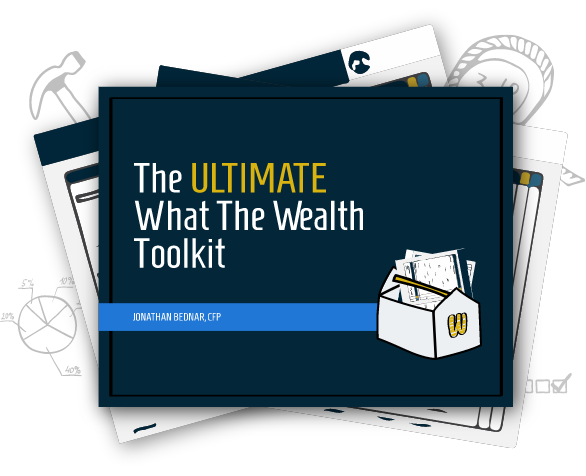What The Wealth Ep #82: What Happens Next? Second Half of the Year
It’s hard to believe we are nearly halfway through the year, but here we are in June. That raises some questions about what may happen in the back half of the year. That’s what we’ll discuss in Episode 82 of What the Wealth.
The market hasn’t seen an all-time high since December 2021. 2022 was brutal; the Fed raised interest rates several times, inflation was high and kept climbing, the S&P was down 25% at one point. It’s been a hard grind for investors and the market.
What might be coming in the short to intermediate term, and how can we plan for it? I’m not making predictions, but these are some things that are keeping the market and investors on edge as we close out the year.
Inflation
Inflation is finally starting to cool, some of that because of how inflation is measured, on a rolling 12-month period. In the new month’s report, the 13th month falls off. Now we’re at the point where the numbers from the late spring and early summer of 2022 are falling off, and inflation will continue to come down as that continues.
This will be a positive for the market and the economy and should see the Fed pause the rate hikes. I thought they shouldn’t have made the last rate hike and instead let things play out, but they’ve been steadfast about raising the rates and vowed to continue them if they feel it’s warranted, which is tempering the market’s optimism about falling inflation.
Debt Ceiling
Washington has played chicken with the debt ceiling before. How many times before? The debt ceiling has been raised 78 times since 1960. This is far from the first time we’ve been here, and it won’t be the last as long as the country continues to run without a balanced budget.
But failing to raise the debt ceiling means the U.S. defaults on its debts, which would impact our integrity as a country and send ripples around the world. Despite all of the posturing, neither side will risk it. The market doesn’t like even a whisper of uncertainty, though, so this little game of brinksmanship is negatively impacting things.
*At the time of recording, raising the debt ceiling was still being debated. At the time of writing, the ceiling was indeed raised like everyone knew it would be.
Banking Crisis
Silicone Valley Bank, Signature Bank, and First Republic failed in the first half of the year, and a few other banks, Wester Alliance, Zion, and PacWest, are on shaky ground, which is still weighing on the market. PacWest saw 10% of its deposits moved recently. Banks failing isn’t new; four to six banks typically fail each year.
What was surprising was the size of the banks. During the 2008-2009 crisis, everyone was concerned with banks that were “too big to fail.” The idea was that smaller banks, community and regional banks would relieve some of the pressure on the big banks.
Now the opposite is true, all of the failed and failing banks are regional banks, and they have a lot of commercial real estate on their books in the form of loans. If they continue to fail, the impact will be broad. So the irony is the bigger banks are reaping the benefits of the small banks failing. People are taking money out of the smaller banks and taking it to the big banks—a total 180 turn.
Recession
From a market performance perspective, it feels like we’ve been in a recession. The current drawdown, without hitting a new market high, has gone on for 339 days at the time of recording. That’s the longest we’ve gone without a V-shaped recovery since the 2008-2009 crisis.
This state of affairs has been dragging on for 17 months. It’s normal if uncomfortable and healthy, even if it’s painful because it’s flushed out inflation and some of the euphoria in the market.
How bad is it going to get? Are we heading towards 2008 again or 2001 when the tech bubble burst? I don’t think so. A lot of the time, there is a recession before the recession is formally announced. And usually, once it’s announced, we’re starting to come out of it.
If we get the official call in the second half of the year, expect the recession to be mild and over quickly. But at this point, we’re 17 months in. If we’re “officially” in a recession for the next six or eight, or nine months, which isn’t long for a recession, but we tack on the past 17 “recession-like” months, we’re looking at two years which is a prolonged recession when we’re talking about market performance.
Moves to Make
You can take advantage of the current market if you’re a patient investor and young. Prices are low right now, so it’s a good time to invest for a long-term, positive outcome.
If you’re an older investor with some runway, consider turning on dividend reinvesting. You can use this strategy to dollar-cost-average and buy more shares and put those dividends to work for you. They’ll give you more shares to grow when the bounce back inevitably happens.
And things aren’t all grim. Data from market performance, companies increasing dividends, buybacks, and earnings all look really good.
If you have questions about your portfolio or retirement plan, reach out to me at Jonathan@whatthewealth.com or call the office at 865-251-0808.
And check out my new YouTube channels. The videos are short, walk and talks, where I take a stroll and talk about whatever’s on my mind. I also have a Paradigm Wealth Partners channel and have recently created an Instagram page.
Listen to the Full Episode:
What You’ll Learn In Today’s Episode:
- Where we are with inflation and what can be expected.
- The issues with our debt ceiling, defaulting, and what might happen with this.
- What’s going on with the bank failures and how this is affecting the market.
- How this time is a bit different and why that might be happening.
- How you can make what’s going on in the markets work to your benefit.
Ideas Worth Sharing:
- “The debt ceiling has been raised about 17 times since 1960, so this is not the first time we’ve had this experience and it certainly won’t be the last.” – Jonathan Bednar
- “The ironic thing is that we’re seeing the bigger banks benefit from the smaller banks failing.” – Jonathan Bednar
- “Buy more shares and let those dividends work for you instead of paying the cash and having it sit there on the sidelines.” – Jonathan Bednar
Resources In Today’s Episode:
- What The Wealth?! by Jonathan Bednar
Enjoy the show? Use the Links Below to Subscribe:





